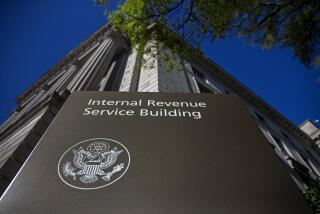Tax violations? It’s complicated
- Share via
Re “Tax code’s poster boy,” editorial, Jan. 15
The Times states that it is willing to accept Treasury Secretary-nominee Timothy F. Geithner’s contention that his tax errors were inadvertent.
The Times says that the complex rules that trip up financial sophisticates such as Geithner are a minefield for the honest.
Hogwash! He of all people should be aware of the tax rules. Also, he has at his disposal tax experts.
Granted, the tax code is complicated. But the tax laws Geithner apparently overlooked have been around for a while and are not that complicated, particularly with respect to payroll taxes.
Edwin Gauld
Los Angeles
--
The Times argues that Washington should “whittle down the tax laws, stripping the layers of incentives and disincentives in favor of a system that simply raises the money needed to fund the government in a fair and equitable way.” This is a nice idea, but it betrays a misunderstanding of the sources of complexity in our tax system.
To be sure, “incentives and disincentives” produce complexity, but the never-ending quest for a “fair and equitable” tax system accounts for most of the law’s mind-numbing intricacy.
Take the alternative minimum tax, cited by the National Taxpayer Advocate as the “poster child for tax law complexity.” Few taxpayers would disagree. But the AMT has its roots in a desire to craft a fair and equitable tax system. In fact, in 1969, The Times declared that “there should be a proviso that the wealthy pay at least a minimum tax.”
We do ourselves and our tax system a disservice by perpetuating the myth that fairness and simplicity go hand in hand. The sooner we face up to inescapable trade-offs, the more likely we’ll craft a tax system we can live with and maybe even comply with.
Kirk J. Stark
Los Angeles
The writer is a professor of taxation law at UCLA.
